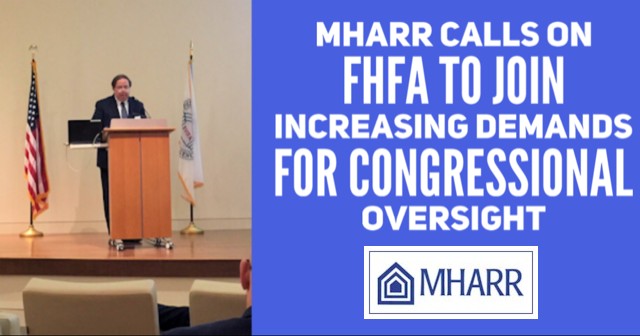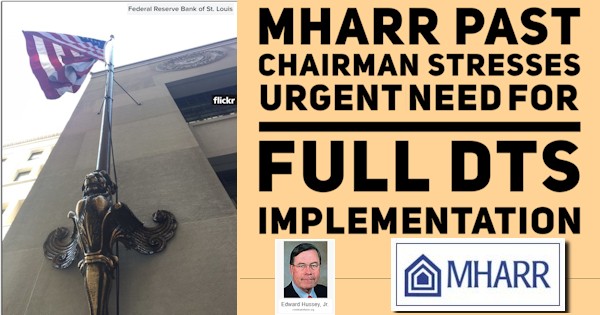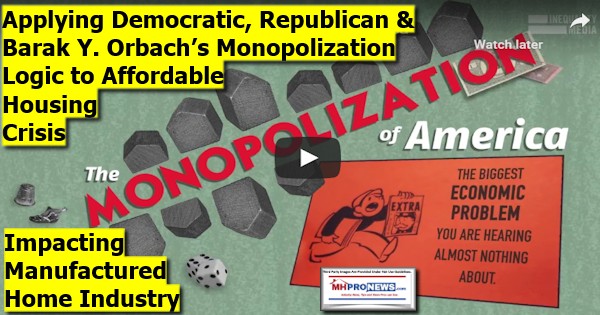
Josh Hawley, JD, is his state’s junior senator (MO-R) who just turned 40 yesterday. “As Missouri’s attorney general, he launched an antitrust probe against Google in 2017. In his six months in the Senate, he has attached his name to no less than five bills aimed at regulating and reducing the power of Big Tech. He routinely raises the prospect of breaking up Facebook,” said the New Republic on July 25, 2019.
Robert Reich, JD, has served in Democratic as well as a Republican administration in various capacities. “Robert Bernard Reich (born June 24, 1946) is an American economist, professor, author, and political commentator. He served in the administrations of Presidents Gerald Ford, Jimmy Carter, and Bill Clinton. He was Secretary of Labor from 1993 to 1997. He was a member of President Barack Obama’s economic transition advisory board,” says Wikipedia.
Reich and Hawley are among an increasingly bi-partisan set of voices who are raising the issue of the monopolization of certain sectors of the economy. While Hawley and Senator Ted Cruz (TX-R) have tended to focus on the monopolistic power of big tech, Reich and other Democrats have taken a broader look at how the nexus of money and political influence are protecting consolidators that antitrust laws passed in the late 19th and early 20th centuries were supposed to stop.
But the specific topics each has focused on should not diminish this next key takeaway. Antitrust laws – legislation designed to prevent or break up the monopolization of various parts of the economy – have to some degree been derailed. As Reich’s video below points out, wide sectors of the economy are already in the hands of just a few players. Given antitrust laws, how has that steady multi-decade trend occurred?
Reich said that part of that has been the result of ever increasingly lobbying. Also related is this. Antitrust legal expert Barak Y. Orbach, J.D., has said that the legal theory of Robert Bork, J.D., has a fundamental flaw. Nevertheless, Bork’s view was allowed to take root among lawmakers, regulators and courts during the late 20th and early 21st centuries.
Reich has also grimaced over Bork’s influence on antitrust, noting that as a law student he studies included classes led by Bork.
Orbach has spent years examining and attempting to correct-the-historic-record on what he as an antitrust expert believes is the fundamental flaw of Bork’s thesis.
For example, in an article entitled HOW ANTITRUST LOST ITS GOAL, Orbach explains his well-documented contention, that he sums up like this:
“The Essay [How Antitrust Lost Its Goal] concludes with a straightforward observation: “consumer welfare” may continue serving as the stated goal of U.S. competition laws but, practically, antitrust has always been and will always be about the preservation of competition.” See that article by Orbach linked here.
Antitrust Laws are Anti-Monopolization Laws
Orbach in another article expertly walks his readers through what he called Bork’s confusion or mislabeling of terminology in a fashion that became problematic for antitrust law enforcement, precisely because Bork’s position became popular. Of course it did, Reich’s bookend thesis might say, because special interests intent on derailing antitrust laws’ true purpose – to protect competition and how that benefits smaller businesses, consumers and innovation – would want to defang the Sherman and Clayton federal antitrust acts.
Rephrased, re-interpretation of the plain meaning of antitrust law has steadily benefited consolidators to the detriment of smaller independents. This is true across an array of industries, not just affordable or manufactured housing. It is a trend MHProNews has reported on in media as well as other segments of the economy that Reich’s video has similarly noted. While there may seem to be some short-term benefit to consumers in the form of lower prices, it also has near-immediate harms too.
Those harms, Reich and others have reasoned, include but are not necessarily limited to:
- lost jobs when mergers occur,
- lower wages because of fewer competitors,
- lost competition to keep economic and thus political power in check and
- lost opportunities to innovate, which routinely comes from smaller businesses or start- ups.
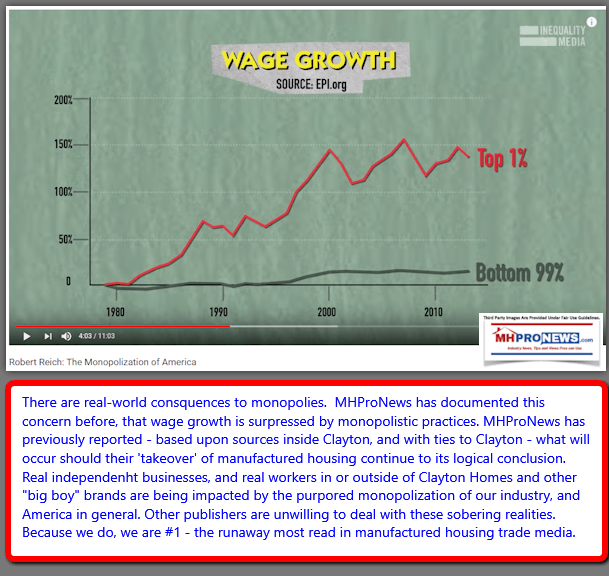
Each of those bullets above in turn have social, political and taxpayer impacts too. People who make less or are out of work will more likely be in need of taxpayer assisted social welfare programs.
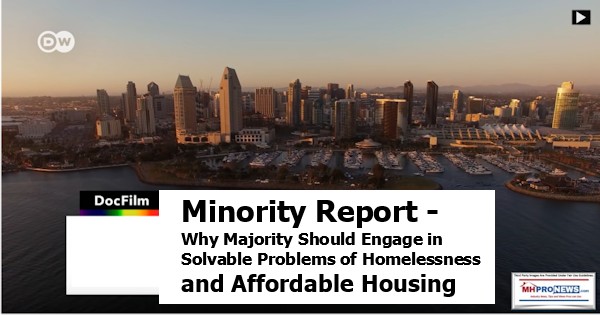
While the precise math might be complex, it is not unreasonable to say what several lawmakers have already expressed. Cheaper products and lower wages from corporate giants are de facto subsidized by taxpayers and government. Is there any real ‘savings’ to consumers to tolerate consolidation under the Borkian premise of savings and efficiencies when those social, economic and tax factors are accounted for, or is it as or more expensive but masked by government carrying several costs?
Isn’t it at least possible that there is more harm than alleged good from allowing economic and political power to accumulate?
Ultimately, many taxes are paid directly or indirectly by the middle and lower economic classes. Big businesses bundle their tax costs into the pricing of goods and services. What that means in terms of the cost of consolidation is that what appears to be a cheaper price in fact carries several hidden costs with it that could make the net cost higher had business consolidation not occurred. That’s the simplified logic of years of research on related topics.

In How Antitrust Lost Its Goal, Orbach wrote that:

- Section 2 of the Sherman Act outlaws monopolization—that is, exclusion of competition. Sections 2, 3, and 7 of the Clayton Act ban price discrimination, tying, and mergers that “may . . . substantially . . . lessen competition, or . . . tend to create a monopoly.”
- Section 5 of the Federal Trade Commission (FTC) Act prohibits “unfair methods of competition.”
- Indeed, antitrust inquiries have always focused on competitive effects, or at least this has been their perceived intent. Correspondingly, the preservation of competition in business has always served as the most intuitive and obvious goal of competition laws. [Highlighting added by MHProNews for emphasis.]
Intention of Lawmakers
Logically, the principle of legislative intent is the standard used whenever there is doubt about the meaning of a law. But there is also an often complimentary point; how was the law used or understood when first passed?
“During the first seven decades following the enactment of the Sherman Act, competition was the uncontroversial goal of antitrust,” said Orbach in How Antitrust Lost Its Goal.
So not only is there a strong history of the legislative intent of antitrust laws – to foster competition, and break up or prevent monopolization – but there was also decades of lived legal experiences, stated Orbach.
The Trump Administration’s top antitrust cop pointed last summer to this statement by ‘founding father’ Thomas Jefferson, who thought that laws preventing monopolies need to be part of the constitution. What that reminds us is that anti-monopoly sentiment predates the founding of the United States. The so-called pre-Revolutionary war Boston Tea Party on December 16, 1773 was a mix of protext on the tax on that tea, but also the British Crown’s grant of monopoly to the company that sold the tea. Monopoly power and government have a long history. Monopolozation and consolidation only occur when government tolerates and/or actively promotes it.
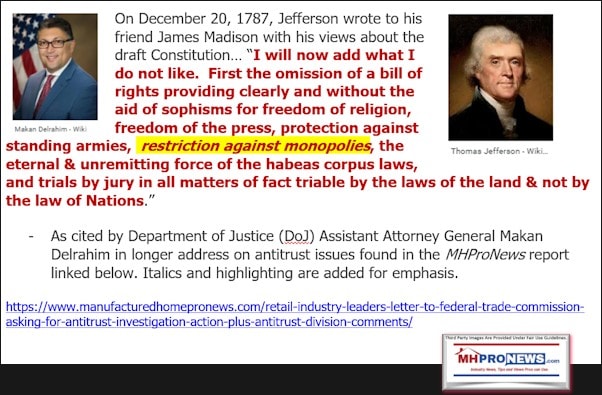
Reich, a Democrat, noted in the video below that “even Democrats” had lost their way for a time on antitrust laws. Fair to say, both major parties have failed in this regard for some time. But as noted above, Republicans and Democrats alike are beginning to see anew the numerous social, political and economic harms wrought by failure to robustly enforce antitrust laws.
Critics of this analysis might say that items herein are being cherry picked from various citied thinkers to forge this case. That might be true enough. But each of those quotes and references nevertheless would be accurate and the logic of their being applied in this fashion would still be valid.
Indeed, the contention here is that each of those points are properly presented in a manner that sums up what is occurring in America in general, as Reich’s tightly-focused video aptly illustrated. But all of that background brings us to the focus of our publication, which is affordable housing and the manufactured home industry’s role in it.
Affordable Housing and Consolidation
The question then becomes: how does this pattern apply to affordable housing in general and the manufactured home profession, its current and potential homeowners specifically?
Our new report on Manufactured Home Living News linked below documented how the current House Financial Services Committee Chair, Maxine Waters (CA-D), along with some of her colleagues, made the argument some time ago that the Manufactured Housing Improvement Act of 2000 was not only a consumer protection law, but it was also affordable housing legislation. Or as Congress framed it, the Manufactured Housing Improvement Act of 2000 (MHIA) includes protecting the “affordability of manufactured homes,” and “facilitating the availability of affordable manufactured homes and to increase homeownership for all Americans.” Waters’ and her colleague’s claims were attested to by the language of the MHIA law itself. The report below takes a detailed dive on that and related concerns.

Unite those points above with what the FHFA’s website says about the Duty to Serve (DTS) manufactured housing, and one will increasingly see the reasoning behind the 5-page PowerPoint presented at the final virtual “Listening Session,” found at this link here.
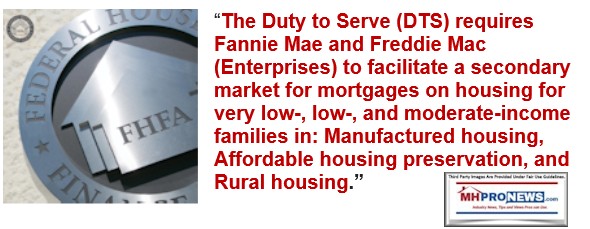
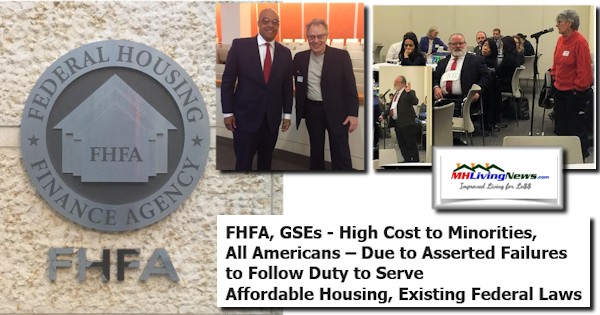
For new readers of this site, keep in mind that there are decades of research by third-parties that debunks the commonly held misconceptions about manufactured homes. The consumer protections built into manufactured housing have demonstrably performed well. The pull quote below from 2018 may seem startling to newcomers, but is fully supported by reams of research found linked below it.
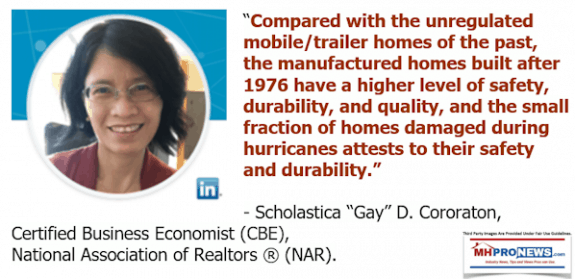

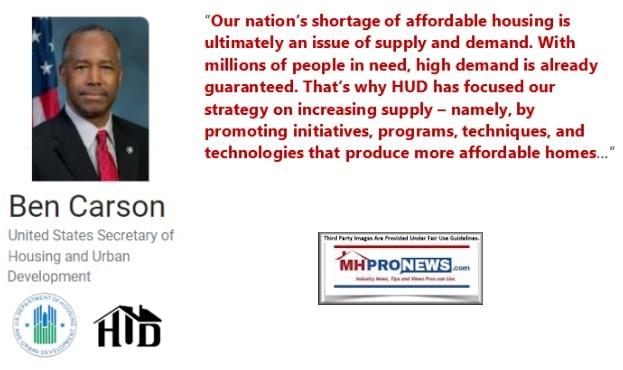


What Cororaton’s research for the National Association of Realtors (NAR) in 2018 did was confirm a point that the Government Accountability Office (GAO) previously made about manufactured homes. Even with higher interest rates on so-called chattel or personal property loans, the monthly payments to own a manufactured home are routinely lower than the cost for renting a similar sized residence.
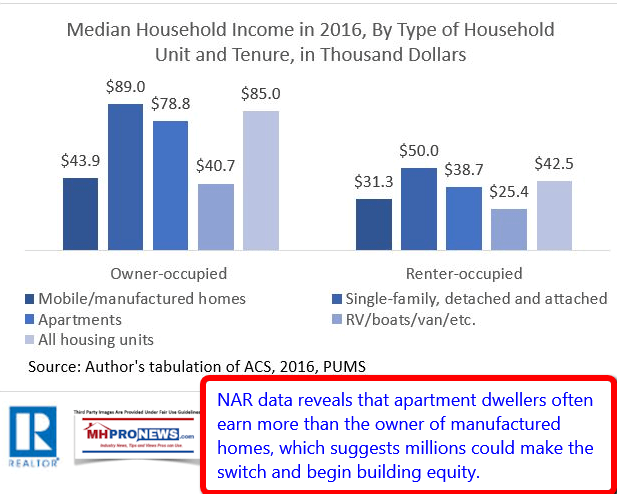
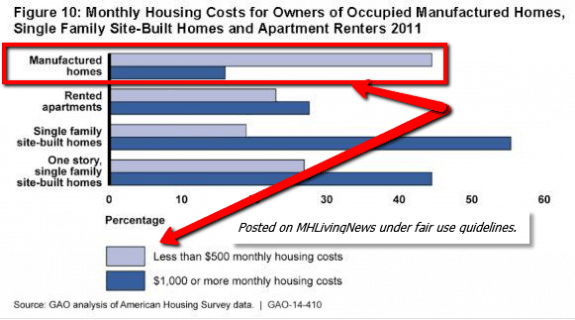
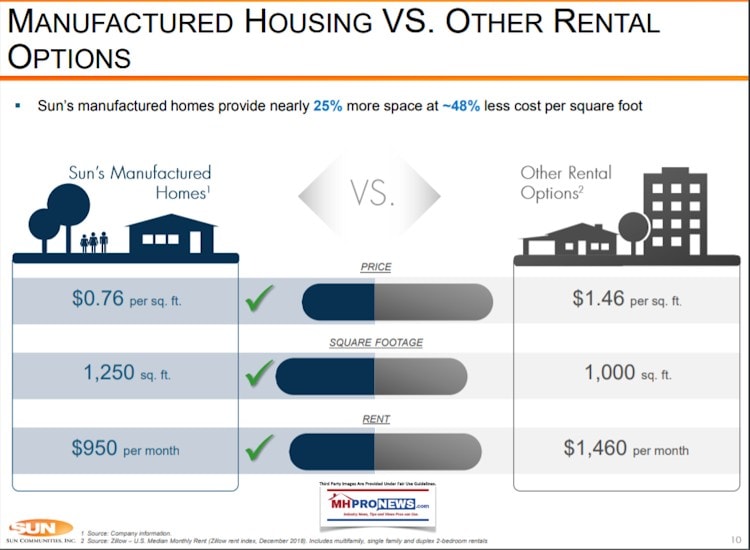
The data is plain from a range of sources inside or outside of manufactured housing. So when affordable housing is an issue, of course there ought to be a careful examination on how public policies in general, or antitrust and other laws impacting manufactured housing play out in the real world.
Summing up to this point, the following could be fairly stated as follows.
- Antitrust laws has been diverted from their original intention. That objective was and remains to protect competition and prevent and/or break up monopolization. That in turn benefits consumers’ interests.
- That stated aim of antitrust – anti-monopolization laws – ought to be restored for the good of the population at large, smaller businesses, and to be faithful to the true nature and meaning of the law. To the degree that the public needs to be informed on the rationale for that, such an effort needs to be launched. But frankly, millions already believe that the “system is rigged.” Clear statement of how that ‘rigged system’ has been developing could rapidly make sense to those who don’t already see the evolving pattern.
- That begs several questions, which include, but are not limited to: how could this have occurred in the first place? The clear answer will routinely be that those who are connected with the support of deep pockets have paid to influence the issue in a manner that favors the interests of consolidators. Reich aptly made similar points in the video above. Others, such as the Open Markets Institute, have made similar points too.
- Useful aspects of good federal/state laws that already exist need to be enforced. There is no need for more research, new legislation, etc. The tools of antitrust, RICO and other law enforcement – such as the MHIA and FHFA regulations – already exists.
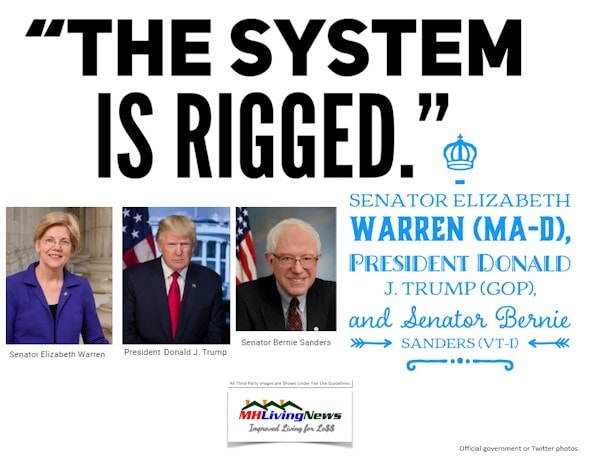
Has Warren Buffett led Berkshire Hathaway, Clayton Homes and 21st Mortgage Violated Antitrust Laws?
There is a straightforward case to be made for prima facie violations of antitrust and other laws.
“Do the Antitrust Laws Prohibit Tying Products or Services Together for Sale? Yes…Tying agreements—along with price-fixing, market allocation, bid-rigging, and certain group boycotts—are considered per se antitrust violations,” per the Antitrust Attorney website on Jun 9, 2019.
But that is precisely what the letter from 21st Mortgage Corporation President and CEO Tim Williams did below. He tied getting floorplan and other lending to the sale of Clayton Homes products. But beyond that, there are other obvious efforts to rig the marketplace in a manner that would consolidate much of the industry into the hands of Berkshire Hathaway owned brands.
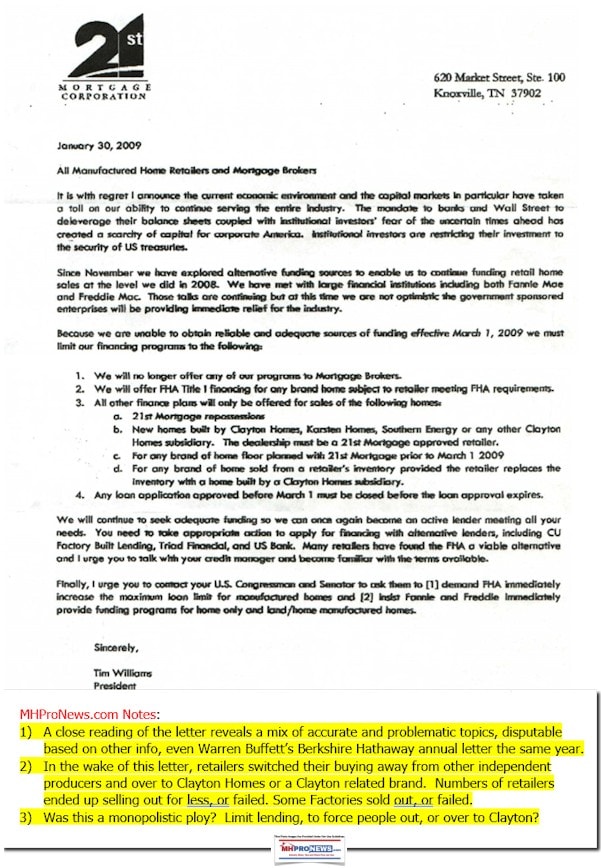
Thus through the fallout caused by this letter, Williams arguably violated other federal and/or state laws in the process, not just “tying.” There were false and misleading statements made in that letter. That letter’s “per se antitrust violation” – applying the quote above – aimed at depriving literally thousands of businesses of their rights through deception and what amounts to economic coercion. Transmitting that letter via “the wires” or the U.S. Mail are elements of RICO violations. Each of those claims flow from the contents of the letter and how it bumps up against an array of laws.

That said, where was the Manufactured Housing Institute (MHI) during all of that drama caused by 21st and the Berkshire brands machinations?
MHI publishes an antitrust statement that is provided to members before meetings. There is no ignorance of the law on their part. That logically implies that key MHI staffers failed to advise relevant officials about several legal concerns raises concerns about those in authority at MHI. It also harkens as well to purportedly crossing conflict of interest and other mandates lurking in this dark monopolistic scheme.

MHI further claims in IRS filings under penalties of perjury to be working to ‘improve the market,’ when in fact the items linked herein reflect the point that the market has been harmed which in turn harms smaller businesses and consumers alike. The report below looks at MHI’s role in that process.
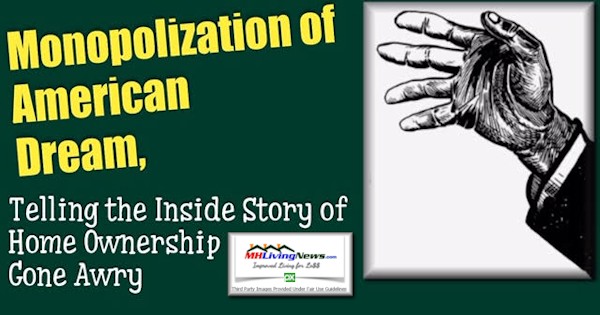
So, an argument can be made that MHI violated – and continues to violate – IRS regulations and may also be guilty of antitrust, RICO and other state or federal law violations. Given the years of influence of Berkshire Hathaway over MHI, is that a surprise?
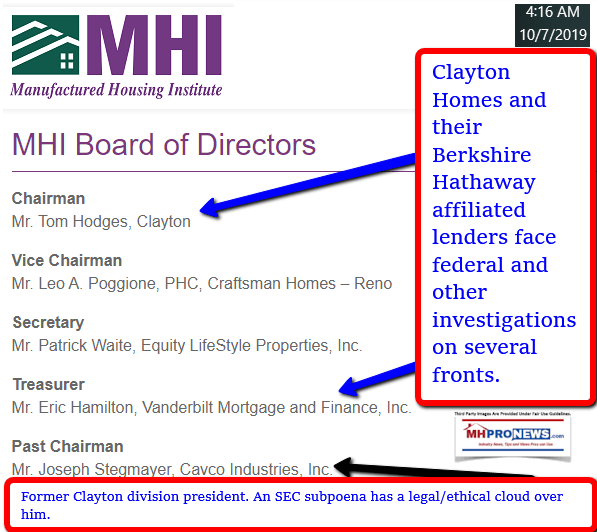
While Clayton Homes and 21st are in the Foreground, Several Manufactured Home Communities Are Also Purportedly Involved
By artificially limiting the understanding and use of good existing laws, along with diminishing the acceptance and thus the development of more manufactured home placement options, several costly consumer impacts occur.
In no particular order of importance:
- Fewer options for placement creates upward pressure on site fees (a.k.a. “lot rents”) for residents of land lease communities. It’s economics 101.
- NIMBY and other resistance – arguably fostered by bad news that routinely traces back to MHI linked ‘big boy’ brands – limits interest and opportunities for new companies to enter the space.
- Recent published statements from publicly traded stocks supports these concerns.
MHI’s posturing a “code of ethical conduct” without evidence of actually enforcing their code results in a steady stream of problematic behaviors fostering calls for rent controls or other regulations.
Additionally, resistance to more land lease communities or other developments logically grows in the wake of such bad news. All of those conditions support short-term opportunities for consolidators while making professional life more difficult for smaller operators who are not commonly associated with these problematic behaviors.
The results?
Still more consolidation. Still more fuel for upward pressure on site fees. One more barrier in the Buffett ‘Castle and Moat’ strategy.
Barriers to Entry, Persistence, and Exiting in Business, Affordable Housing, and Manufactured Homes
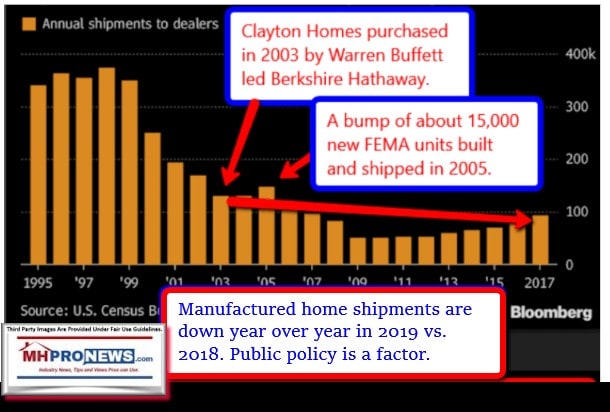

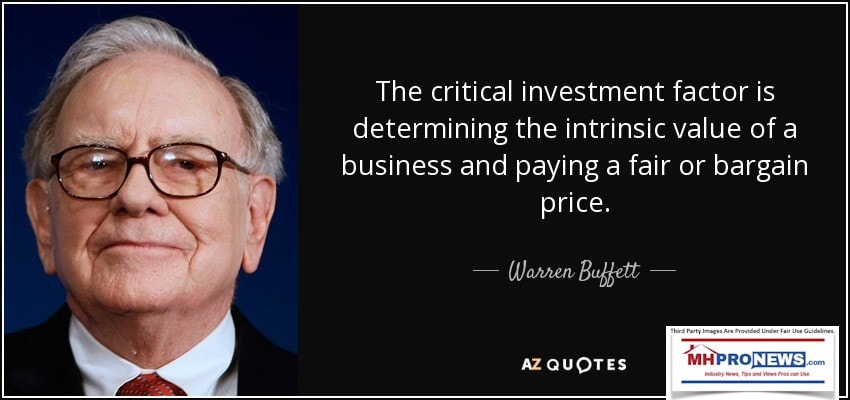


Solutions?
Surprisingly, the solutions are clear cut. It is largely educational and the application of existing laws in a robust fashion.
Additionally, lawmakers should hold public hearings using their subpoena powers to spotlight and publicize the trends, allegations and concerns. The findings of such hearings should be turned over to a range of state and federal agencies so that they can have the maximum resources, information and motivation to act according to the stated purpose of antitrust, RICO, and other laws. Several of the articles linked from herein reflect the concerns of industry professionals and consumers alike on these topics. One example is linked below.

Takeaways, Parting Observations and Conclusion
The economic, political and social problems associated with the Gilded Age and Robber Barron era are what caused antitrust laws to come into existence.
The wide gap between the top 1 percent and the balance of the population in our time mirrors those issues. The difference now vs the much of the later 19th century is that the laws already exist to deal with the issues. What is perhaps missing is the political will to challenge a system that has grown up around lobbying that Reich and others note keeps the status quo enriching a few at tremendous social and economic cost to the many.
Let’s note that this analysis is not in any way opposed to honestly earned wealth. Rather, it is an indictment of any operation which may have manipulated the system in a manner that violates one of several legal principles. Similar to how Reich himself argued, every economic system is governed by laws. Protecting independent businesses from the pernicious power of monopolization protects consumers, taxpayers and society as a whole. To save the free market system, one must insure that consolidation and monopolization are held in check.
Ironically, a good case could be made that the powers that more money could be earned without monopolization. But even if that were not the case, the vast majority will be better off by properly and robustly applying good existing laws. The report linked below outlines why.

What has been occurring in manufactured home industry – which is the most proven form of affordable housing – is not so different than what happened to the Tucker automobile.
Perhaps more important, the economic harm from these anti-competitive behaviors and patterns is demonstrably higher than the estimated $60+ plus billion caused by con-man Bernie Madoff.
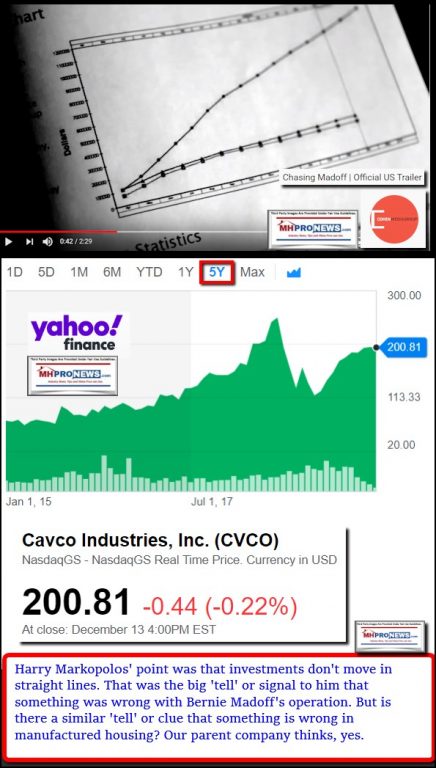
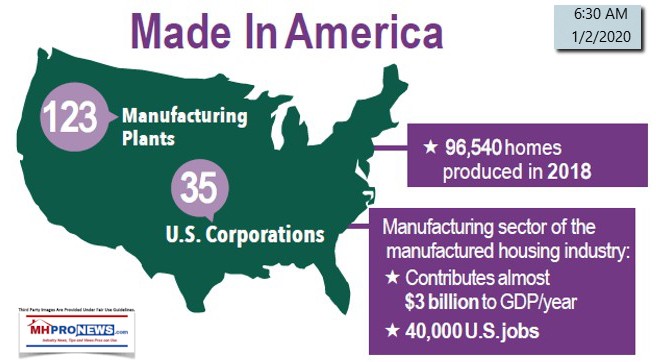
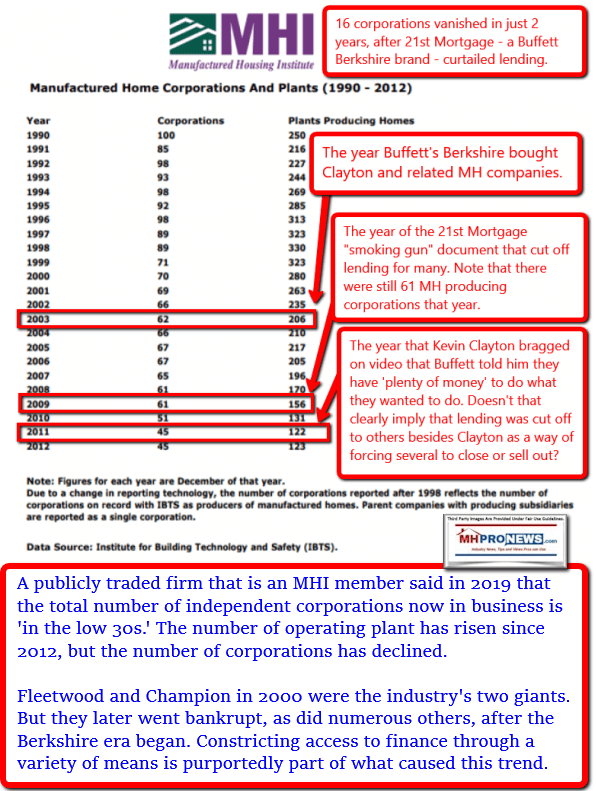
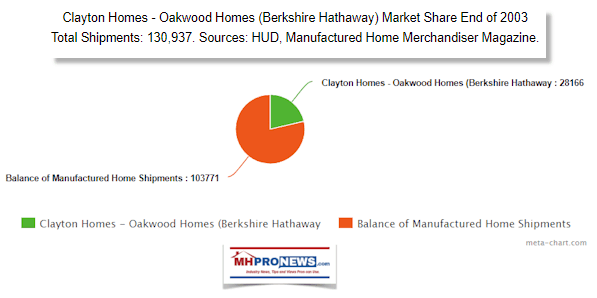
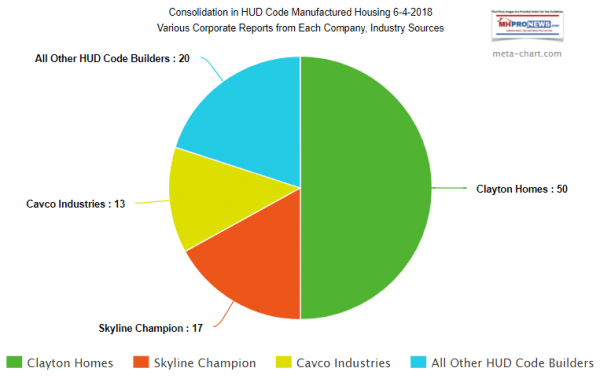
That letter from 21st’s Tim Williams arguably created a cascade effect. Some estimate that over 10,000 independent retailers vanished. Dozens of manufactured home producers, many who had existed for decades, were wiped out from the fall-out of activities that purportedly violated antitrust and other laws.
Meanwhile, MHI and the Berkshire brands have fostered their own narrative of ‘industry promotion’ that ignores these points. They routinely decline comment on these issues. If they are ‘promoting’ the industry, how is it possible that the industry’s production has dropped so far year-over-year in 2019 vs. 2018? Even MHI, in their twisted logic, has had to admit that point.
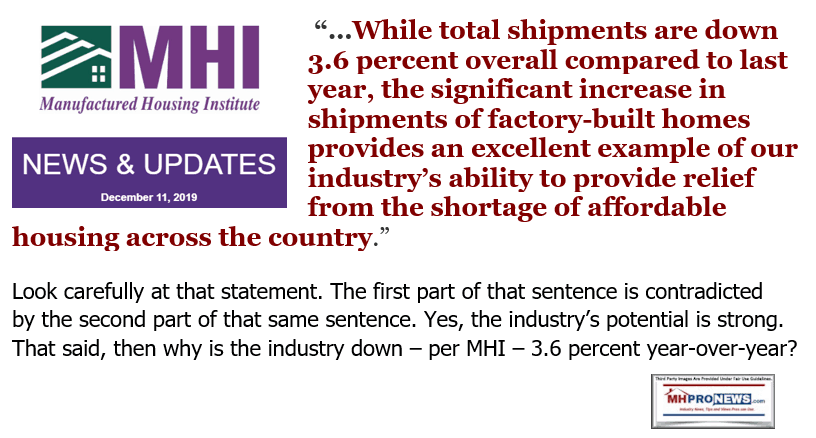
By contrast, the data from independent producer association MHARR – the Manufactured Housing Association for Regulatory Reform – is much more clear.

By choking off lending to much of the industry through the 21st/Clayton/Berkshire brand ploy described herein, the lifeblood of affordable manufactured housing was snuffed out.
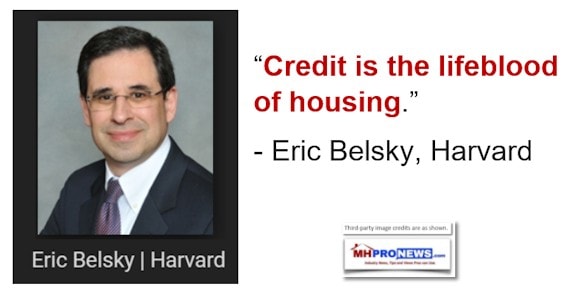
The industry’s independents, investors, residents, and ethically-minded public officials who don’t already grasp the issues should study these concerns, which could initially be done in just a few hours of reading and related video viewing.
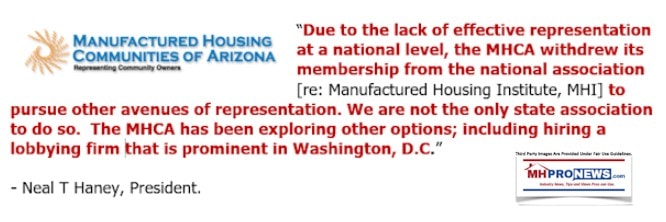
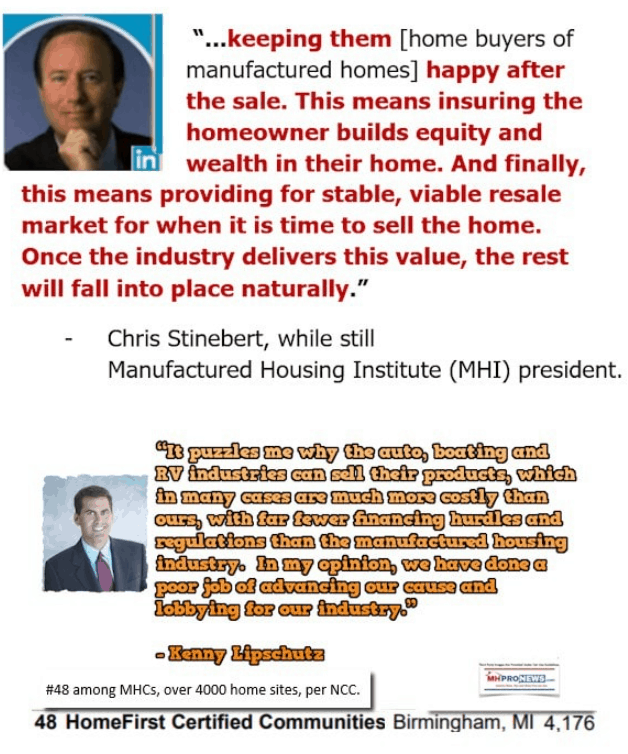
Controlling much of the credit of the industry means that Berkshire has an outsized influence over manufactured housing. That letter from 21st is prima facie evidence of purported antitrust law violation. It was not done in a vacuum. It has had measurable consequences, as this report reflects.
When laws are broken, they ought to be enforced. When the powerful and politically connected violate the laws, they should still be enforced.
There is always more to come, but that’s a wrap for this New Year’s night edition of “News through the lens of manufactured homes and factory-built housing,” © where “We Provide, You Decide.” © (Affordable housing, manufactured home related reports, fact-checks, analysis and commentary. Third-party images or content are provided under fair use guidelines for media.)
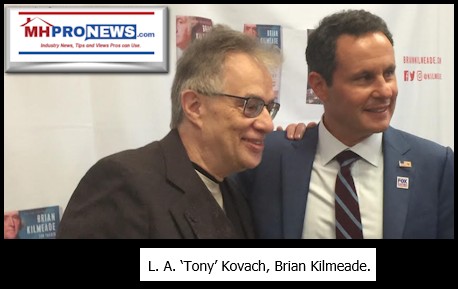
(See Related Reports, further below. Text/image boxes often are hot-linked to other reports that can be access by clicking on them.)
By L.A. “Tony” Kovach – for MHLivingNews.com.
Tony earned a journalism scholarship and earned numerous awards in history and in manufactured housing. For example, he earned the prestigious Lottinville Award in history from the University of Oklahoma, where he studied history and business management. He’s a managing member and co-founder of LifeStyle Factory Homes, LLC, the parent company to MHProNews, and MHLivingNews.com. This article reflects the LLC’s and/or the writer’s position, and may or may not reflect the views of sponsors or supporters.
Connect on LinkedIn: http://www.linkedin.com/in/latonykovach
Related References:
The text/image boxes below are linked to other reports, which can be accessed by clicking on them.


https://www.manufacturedhomepronews.com/masthead/expose-darren-krolewski-datacomp-mhvillage-mhinsider-marketing-claims-fact-check-infographic-and-analysis/
Manufactured Double Talk? Analyzing New Land-Lease Manufactured Home Community Developments






